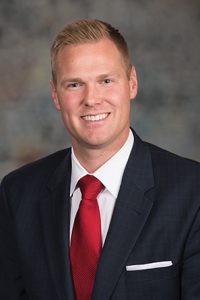Harsher penalties proposed for sexual misconduct
The Judiciary Committee heard joint testimony Feb. 20 on four bills that would impose stricter penalties on authority figures who abuse their power to engage in sexual misconduct with minors.

Under LB766, sponsored by Omaha Sen. Brett Lindstrom, an authority figure who engages in sexual penetration of a victim under 19 would be charged with first-degree sexual assault. An authority figure could include a victim’s guardian or foster parent, temporary caretaker, coach, counselor, principal, teacher or health care provider.
Lindstrom said that people in positions of authority over children have significant power and influence over them.
“The parents of minors teach their children to trust and obey these community members,” he said. “People who abuse that trust and authority should be held accountable for their actions.”
First-degree sexual assault is a Class II felony and carries a penalty of one to 50 years in prison.
Under the bill, an authority figure could be charged with either second- or third-degree sexual assault of a child if they engage in sexual contact with a victim under 19. Second-degree sexual assault is a Class II felony. Third-degree sexual assault is a Class I misdemeanor and carries a penalty of up to one year in prison, a $1,000 fine or both.
A person who commits three or more separate acts of sexual contact with the same victim under age 19 over a period of at least three months could be charged with second-degree sexual assault of a child. Evidence of a victim’s consent would not be admissible in any civil action involving alleged sexual penetration or contact between an authority figure and a victim under 19.
LB766 also would change the statute of limitations for failing to make a report of child abuse or neglect to 18 months from the offense or the date such failure to report is first discovered by law enforcement, whichever is later.
Maddie Fennell, executive director of the Nebraska State Education Association, spoke in support of LB766 on behalf of the organization. There is no acceptable reason for an educator to be in a sexual relationship with a minor student, she said, regardless of the age of consent.
“Currently, if a school employee engages in a sexual relationship with a student under the age of 16, they can be prosecuted by law enforcement,” Fennell said. “However, if the student is 16 or older, the consequences are limited to loss of job and teaching certificate.”
Molly Keane, representing the Nebraska County Attorneys Association, also supported LB766. Prosecutors have been unable to prosecute many acts of sexual abuse of a minor at the hands of an authority figure, she said, because the actual sex acts do not occur until those minors are 16, which is the age of sexual consent in Nebraska.
“These are people we teach our children to trust, to respect and to work to impress from the time they’re toddlers,” Keane said. “Often times, these perpetrators begin grooming these children before the age of 16 but wait to commit sex acts on them [until later].”
Opposing the bill was Spike Eickholt, representing the Nebraska Criminal Defense Attorneys Association. State statutes regarding sexual offenses already are “convoluted,” he said, agreeing with proponents that legal loopholes exist. Eickholt cautioned, however, that passing LB766 might add another layer of confusion to an already unclear section of state law.
Committee members also heard testimony on three additional proposals:
• LB991, sponsored by Hastings Sen. Steve Halloran, which would create the offense of sexual assault of a student and prohibit related enticement conduct by school officials;
• LB1048, sponsored by Grand Island Sen. Dan Quick, which would create the offense of sexual assault by a school employee and provide notification to the commissioner of education; and
• LB1210, sponsored by Omaha Sen. Tony Vargas, which would create the offense of sexual exploitation of a student.
The committee took no immediate action on any of the bills.

